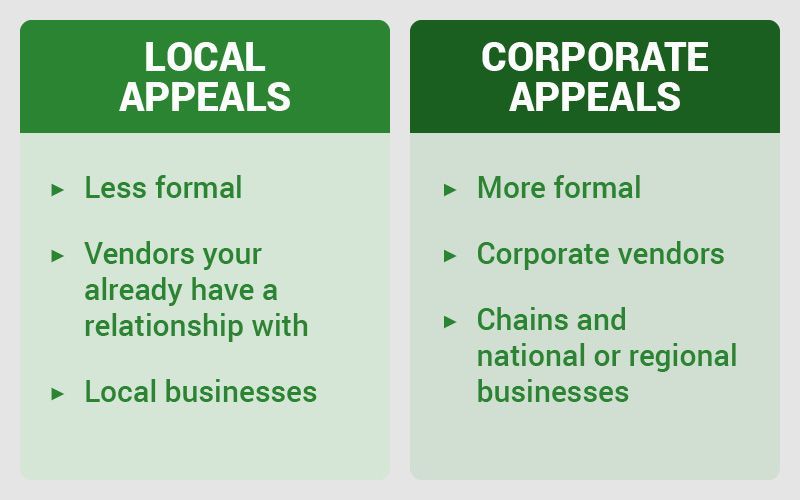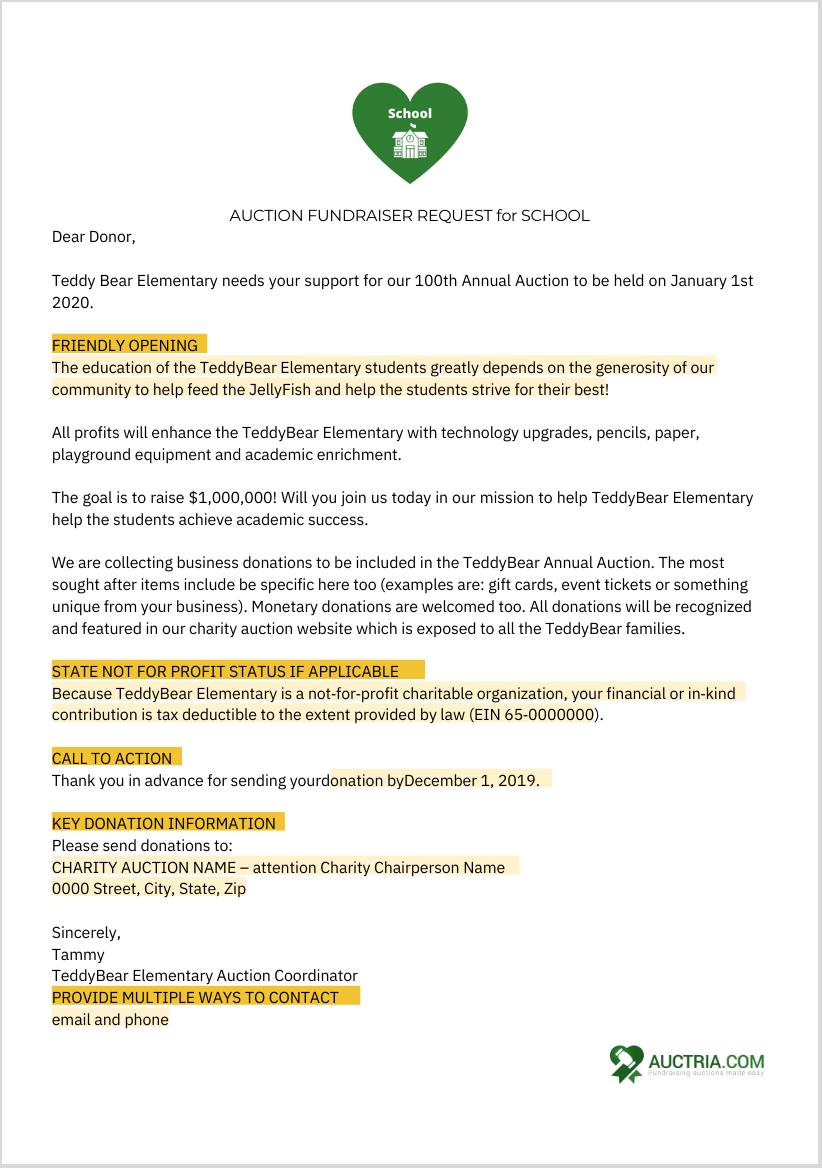Hosting an auction event for your nonprofit is a great way to encourage donations, engage new and previous donors, and build awareness for your mission. Some organizers may shy away from adding an auction to their event because the planning seems daunting - don’t worry! We have lots of tips and tricks to make it easier for you to plan a successful auction event.
Worried about figuring out the right timeline for your planning? Check out useful auction and event planning timelines here!
One of the first things you’ll need to do when planning an auction is to secure donated auction items. These are the items your guests will bid on to raise money for your cause! That means you need exciting items that people will be willing to spend money on - and you don’t want to purchase the items, because that lowers the total proceeds of your event.
Asking businesses, retailers, and service providers to donate to your auction may seem scary, but this article will give you the knowledge you need to write effective auction donation request letters to send to local, corporate, and individual donors.
What is an Auction Item Donation Request Letter?
Clear, effective auction item donation request letters are essential for planning a successful auction event. Auction donation request letters are sent out when you need items or services rather than direct monetary contributions, such as when you’re looking for fundraising event auction items. These letters will be your organization’s first introduction to potential partners. They will outline that you’re holding an event to raise money and awareness for your mission, that you need auction items to be donated, and what recognition and visibility donating to the event will afford donors.
Local vs. Corporate Auction Item Requests
Fundraising and procurement letters generally fall into two separate categories: individual and corporate appeals. Successfully getting a “yes” to your auction item donation request depends upon asking the right people, the right way, at the right time.
Local requests:
- Should be made in person with a face-to-face approach to build rapport.
- Should focus on retailers and vendors your organization already works with regularly.
- Can be more informal since there is an existing relationship - but don’t be unprofessional!
Corporate requests:
- Must be approached more formally because there is no existing relationship between the business and your organization.
- Are made to chains as well as regional and national businesses.
- Should clearly articulate your mission and impact to educate them on your work.
- Should be contacted the farthest in advance, since the businesses will need to go through a more structured approval process.
Bonus tip: you should treat individual requests more like local requests. Focus on individuals your organization already has a relationship with and meet with them personally to discuss the opportunity donating to your auction poses for them.
Here are our 4 Tips for Getting Auction Item Donations:
- Write an Effective Auction Item Donation Request Letter
- Know Who and When to Ask for Charity Auction Donations
- Effectively Respond When Potential Donors Say “No”
- Know When to Say “No, Thank you!” to a Donation
1. Write an Effective Auction Donation Request Letter
An effective auction donation request letter should be sweet and to the point. You should:
- Be friendly
- Be specific
- Include all key information
Be friendly and state your purpose: An auction donation request letter should describe how they can “help the cause”, such as enrich the students, fight the disease, feed the hungry, save the animals. Using action terminology makes the donor feel like part of the solution by simply donating goods or services.
Always include the benefits donors will see from providing an auction item. Describe how they will be recognized, the expected number of attendees who will see their involvement, if the donation is tax deductible, etc.
Be specific:Make sure you’re clear about what donations you’re seeking, timing, and more. What types of donations are you asking for? Request gift certificates, baskets of goods, products, special experiences, VIP access, tickets - essentially anything that has a resale value. It may be helpful to note any specific types of items you cannot accept, as well.
What is the timing of the event? Including a donation cut-off date is vital to ensure donated items come in with enough lead time to be marketed to potential attendees. Calculate when you want to go public with the charity auction and work backward to find a date that gives you and the team plenty of time to get organized.
Include Key Information:Always include email, website, and preferred contact information for you and your organization. Additionally, it’s vital to include the donor name and any other specific information related to them, the business, etc to give the letter a personal touch.
Larger businesses especially may receive many auction item donation request letters - personalizing your letter shows that you aren’t just sending out a generic form to hundreds of businesses with no strategy. Read more about the importance of personalizing donation request letters here!
Do not:
- Use generic greetings like “to whom it may concern.”
- Send your letter to multiple people without finding the appropriate decision maker
- Use the same template for every potential donor
Do:
- Address individual donors by their full names
- Address the appropriate decision maker for businesses (i.e. the owner, manager, or director of public relations).
- Mention any previous contacts you had at the same business so your new contact is aware of the existing relationship.
- Comply with the requested communication request format from the business. If they only want emails, send an email. If they have an online form, use the form.
We recommend including:
- The name of the person you’re contacting
- The name of your nonprofit organization
- Contact names and info for further information
- Links to your website so they can learn more about your mission
- Tax status, ID, and any relevant donor information
- A call to action that asks for donations within a set timeline
Interested in reading through some examples? Here to are some sample auction item donation request letter templates, including one for schools and one for general charity use.
2. Know Who and When to Ask for Charity Auction Donations
Ask everyone! You never know who will say yes. If they say no, ask them if they know of anyone that might donate. Ask vendors that you work with and then ask them to ask their vendors. Word of mouth can be a powerful motivator - make sure everyone you contact has your info so they can pass it on to anyone else they think might be interested.
Getting that first yes makes you feel great! Use that momentum to continue asking. Tell potential donors what other donors have already committed to.
Consider asking for donations while you are spending money at a business. It’s hard for a vendor to say no when you’re paying them for work on a different event. It is easy for a restaurant manager to say yes to a table full of diners, especially their regulars.
Fundraising for a school?
Ask parents, volunteers, & teachers. They may work at an office or have spouses that have unique access. Vendors that service the school should be able to provide something; just think of all the services that come in and out daily.
Fundraising for animal welfare?
Volunteers help from the bottom of their heart. They usually have their own animals and make purchases at animal friendly establishments. Ask the volunteers to help with donation requests.
Fundraising for arts and culture?
Look around and observe what businesses are nearby that benefit from your establishment. Restaurants and shops that gain foot traffic because of your organization are prime targets to ask for donations.
Fundraising for health, welfare or disease fighting?
Define the audience that is participating in your charity auction event and share that information with potential donors. Supporters like to return the favor and patronize businesses that donate to a similar cause.
3. Effectively Respond When Potential Donors Say “No”
Sometimes businesses will just say no, and that’s ok. If possible, try to find out why it’s a no (politely! don’t guilt them for not donating). Sometimes it’s a maybe, sometimes it’s a maybe later. Ask a few more questions to understand so you can make better use of everyone’s time.
Is the reason because the decision maker is elsewhere?
When and how can you reach the decision maker?
Is the reason based on timing? If so, how can you plan differently for your next event?
Is the reason based on the type of charity? If so, maybe you have other contacts that are better aligned that you should focus on in the future.
Is the reason based on the availability of donations? Is there something else like a cash donation that can help you fundraise?
4. Know When to Say “No, Thank You!” to a Donation
Don’t clutter the auction catalog. Say no to coupons, house party requirements, or anything that you feel is more of a sales promotion than an actually valuable item to your bidders. You may bump into solicitors that contact you like timeshare sales people or MLMs.
It’s ok for you to say no items, businesses, and people that don’t feel aligned with your goals and mission. Remember, nonprofits are mission-driven. This means it’s important to your supporters that you work with like-minded businesses, so don’t partner with businesses that aren’t aligned with your goals - even if it means one less item on the auction list.
Bonus Tip: Is a Sponsorship a Better Fit?
Sometimes, a specific auction donation item isn’t a good fit for a potential donor. A sponsorship may be better.
For instance, consider partnering with a realtor. They can’t donate a whole home! However, they can make a monetary donation or sponsorship. Depending on how much they are willing to donate, a sponsorship may be more in line with how they want to support the cause. You can use their donation to purchase a product that will then be raffled, multiplying the effect of their donation.
They might want to make a larger donation or create a matching donation. In this case, they will match (up to a given dollar amount) the funds that you raise. This gives the donor a lot of clout and exposure to your entire audience of supporters, making it an appealing option for donors that want to be more involved!
Ordinary donations make up the bulk of the auction action, Sponsors can help increase revenue multiple times over- here is how.
What Comes After the Auction Donation Request Letter?
The work isn’t done after you send the letter and solicit your donations. Make sure to coordinate pick up of the item in a timely manner and after the event, send the donor an email with details around the success of the event, how popular their item was, any final paperwork, and a note about looking forward to working with them again for your next event!
Expressing gratitude towards your donors and clearly communicating the impact they provided for your event will encourage them to participate again in the future. Read more about thanking your donors here.
Auctria can make these post-letter steps even easier. Auctria streamlines the entire auction process from the first donation to the last receipt. Use our Solicit Donation element to easily set up a form on your event website. Businesses and individuals can fill out the form online and provide donation details to you, simplifying your process. Review the submission, approve the chosen donors, and send a donation receipt after you receive the item to close the communication loop.
Want more tips on maximizing the effects of your auction event? Read our blog on Post-Auction Strategies for Long-Term support here.


